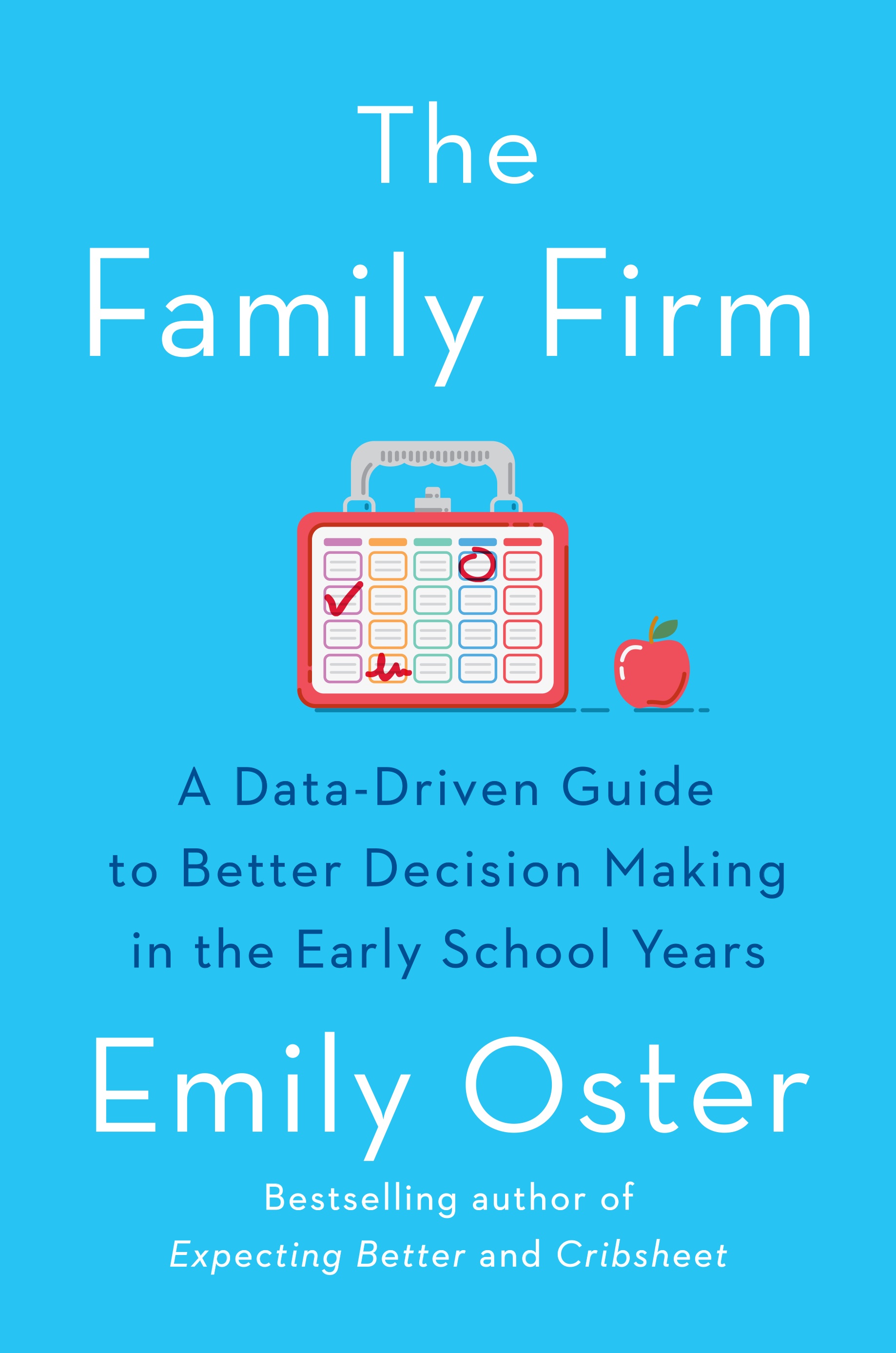If there were only two books to read to prepare you for pregnancy and the first few months of new parenthood they would undoubtedly be Emily Oster’s “Expecting Better” and “Cribsheet”. Now the powerhouse author behind the two cult reads, professor Emily Oster, has written a new book tackling the topic of navigating parenthood with older kids.
“The Family Firm” is really (I think) two books,” says Oster. “It’s a book on data for older kids, much of it quite interesting. And it’s a book on how to structure your family decision-making to make everything run more smoothly, to make you happier. This first part is, really, a business book. Where the business is parenting.” For a firsthand taste, the New York Times published an excerpt.
At the core Oster suggests that families parent more deliberately, taking the time to step back from the day-to-day, from making each individual family decisions separately and think holistically about how they want their family life to look and that when large decisions come up, families adopt a structured decision-making approach—Oster calls it the “Four F’s” —to make these choices.
The Four F’s according to Oster:
- Frame the Question: “Think about the question you are asking. This is often
the hardest step. It may seem easy, but in many cases, our starting-point
question is too vague to really be answerable. ‘What kind of school is right?’
isn’t a question you can answer well. Much better is ‘Should we send our
child to school A or school B?'” - Fact-Find: “Gather the evidence, data, and details you need. This may involve
learning more about the logistics and thinking through how you could make
this work (or not). Or it may involve data on benefits and risks of each option
(risk of concussions in a sport for instance). This step (the longest one) is a
chance to get all the factors together, clearly, in one place.” - Final Decision: “Once you have the evidence, have a meeting, and use that
meeting to make a decision. This may seem obvious, but people often fail to
have this single decision meeting and instead revisit the question again and
again with different information. Let the decision take a lot of headspace in a
single moment, decide, and move on.” - Follow-Up: “This is the least obvious, but may be the most important step in
the process. You need to have a concrete plan for reviewing the decision.
Once you’ve made a choice and implemented it, schedule a time in the
future to discuss how it went. Hopefully you made the right choice, but if
you didn’t, better to rethink it sooner than late.”

Read on for other notable data take-aways from the new must-read.
SLEEP
- Sleep matters! Kids need more sleep than you might think, even as they age through
middle school, and not getting enough can affect their school performance, among
other things. - Different kids need different amounts of sleep, but if your kid is sleepy during the day or
sleeping in a lot on the weekend, this is a clue that they are not getting enough. Try an
earlier bedtime.
NUTRITION
- Our data on what “healthy eating” entails is very bad. Don’t force chia seeds on your
kids just because of some study. - There is evidence that tastes are formed when kids are young, so if you do want them to
eat something, exposing them to that food at an early age is a good idea. Repeated
exposure to foods can increase kids’ taste for them, especially if you combine disliked
foods (e.g., veggies) with liked foods (e.g., dip). - There are strong correlations between family meals and good outcomes for kids. But it is very hard to make causal statements, given other differences between families who
are and are not able to prioritize eating together.
SCHOOL ENTRY AGE
- Benefits to entering school early: Fewer childcare expenses at young ages; children
graduate high school or college and enter the workforce sooner. - Benefits to redshirting (the practice of delaying kindergarten entry for a year so that
they enter at an older age, presumably more able to handle the structure of school):
Lower ADHD diagnoses, better test scores. - Benefits are larger in locations where more people are redshirting; it seems problematic
(on average) to be the youngest in a class.
SCHOOL
- In relatively poor-performing school districts, charter schools deliver (on average) better
learning outcomes. - Test scores tend to be better in schools with smaller class sizes and frequent and
informed teacher feedback. - When comparing schools, look for some outcome data: test scores, proficiency rates.
It’s not everything you care about, but it may be helpful. - Extra school and tutoring do seem to increase test performance, albeit at the cost of
other uses of that time. - Phonics-based reading instruction is the learning method best supported by the
evidence. - Kids are more likely to enjoy reading if they read about topics they are interested in, and as a result, there is value in letting them choose their books.
- New technology: Computer-based tutoring is not as good as in person tutoring; E-books the same as regular books; audiobooks can help with story comprehension.
EXTRACURRICULARS
- Youth sports seem to have some small impacts on long-term sports participation, but no
evident effects on weight. - There is no good evidence that learning to play music actually enhances brain function.
- Concussions are serious, and some sports (football, girls’ soccer) carry more significant
risks for concussion than others. - Participation in extracurricular activities does seem to deliver some socio-emotional
benefits. This may be a result of an increased feeling of ‘belonging.’ - Your child does not need to engage in these activities at pre-professional levels to
receive these benefits.
SCREEN TIME
- Time is finite. Watching television takes time that could otherwise be spent doing other
things; there is an ‘opportunity cost’ that is worth considering. BUT sometimes it’s fine
to take a break. - Kids can absorb content from TV, so it is worth monitoring and curating what they
watch. - The evidence suggesting violent video games lead to violence is based on laboratory
studies and does not seem to be quantitatively important in the real-world context. - Video game addiction does happen, but it is rare and may well reflect underlying issues.
- Screens before bed affect sleep and are therefore probably a mistake. For you, too.
- A note about social media: If you’re a person who likes data, the social media area can
drive you insane. There are papers— so many! — saying it’s bad, or it’s good, or it’s
good for this kind of person or bad for that one. But there is no substitute here (or in
parenting generally) for paying attention to what is going on with your kid. Some kids report positive benefits from social media interactions. Some kids are clearly harmed by social media use. Most evidence suggests that there are no effects . . . but the evidence isn’t very good. Bottom line: there is no substitution for thinking.








